
| 2022 | GOING PRO A new student agency launches to give students realworld communication experience and clients access to young talent.
BEST COMMUNICATION STRATEGIES FOR
A DIEDERICH EXPERIENCE BRINGS STUDENTS AND ALUMS TOGETHER N PUERTO RICO. P. 16
ON THE FRONT LINES OF THE UKRAINIAN REFUGEE CRISIS. P. 14 | Diederich College of Communication
RESEARCHING
CRISES. P. 4

Marquette University COMM Diederich College of Communication 2022 No. 10 NEWS 02 Inside Information Requests: Researching whom freedom of information laws serve 03 Shining the Light: VIP Theatre program gives voice to students of color 04 Stealing Thunder: Researcher explores how to best communicate amid crises 05 Master Shot: Feature film project gives students hands-on experiences 06 Reporting for Change: Exploring how inclusive stories can be acts of justice 07 Full Circle: New director of student media returns to his alma mater 07 Comings and Goings: Distinguished retirements and new faces on campus 08 Above and Beyond: 2022 Alumni National Award recipients honored 09 Recipe for Success: Pilot program to bolster student success takes flight FEATURES 10 Going Pro: New student agency provides real-world experience for emergent talent 14 On the Front Lines: Alumna reporter shares the experiences of Ukrainian refugees 16 La Isla del Encanto: The Diederich Experiences relaunch with flair in Puerto Rico THE GRAPEVINE 20 Full Potential: Alumna promotes opportunities for people with disabilities 21 Unearthed Treasures: Two-time Grammy winner shares music’s untold histories 22 A Collective Responsibility: Servant leader provides the power of hope 23 Reputation Matters: Corporate communication vet navigates client reputations 24 A Hope-filled Light: Supporting Ukrainians one candle at a time 25 Words from the Wise: Journalism alumnae collaborate on a book 60 years in the making Comm is published for alumni, colleagues and friends of the college. We’d love to hear your feedback and story ideas for future issues. Email sarah.koziol@marquette.edu. DEAN OF THE DIEDERICH COLLEGE OF COMMUNICATION Dr. Sarah B. Feldner EDITORIAL TEAM Sarah Koziol, Arts ’92 (editor), Stephen Filmanowicz, Cailin Hostad, Jennifer Russell, Karen Samelson, Enrique Torruco, Stacy Tuchel DESIGN Chelsea Mamerow ON THE COVER Carl Collective staff (l to r) Gabriella Santamaria, Patrick Leahy and Stella Quinlan in the Johnston Hall office
Photo by Aliza Baran
DEAR DIEDERICH COLLEGE OF COMMUNICATION ALUMNI AND FRIENDS:
“Talk was magic, it turned the world, it was power when you knew how to fuse it with what mattered. ... Conversation threads and weaves the world.” This line from Carolina De Robertis’ novel The President and the Frog caught my eye as a communication scholar and teacher. We in the Diederich College tend to agree that communication is like magic, and it does play a central role in creating the world as we know it. The character who speaks these words is the president of a war-torn nation. When he speaks of his call to serve his country, he reflects, “I saw a gap between the world as it was, and the world as it should be. That gap was a wound. … How could I rest until it healed?”
These lines from a contemporary novel speak to the centuries-old Jesuit spirituality that undergirds a Marquette education and solidifies communication education’s place within it. A Jesuit education calls us to use our professional and ethical preparation to heal the brokenness of our world. When we think about healing the wounds of our world, we may assume that these efforts require working in government or engineering a better solution or providing health care. To be certain, these efforts are imperative, but we would be remiss if we failed to recognize that communication is essential to bringing about the change we hope to see in the world. Communication is required to create the communities that fuel our humanity.
The stories we tell, the reporting we do, the performances we stage, and the communication we use to manage organizations of all types are how we more fully understand the world as it is and how we articulate a vision for the world as it ought to be. In this issue, we explore the ways our research, teaching and student programs use communication skills to share stories of social justice, experience other cultures, understand access to information, and practice professional skills that will allow our graduates to create just and equitable workplaces.
I hope you enjoy reading about our faculty, students and alumni. Perhaps their stories will serve as a reminder of the magic of the world, and how together we can move closer to the world as it ought to be.
All my best, Dr. Sarah Feldner Dean Diederich

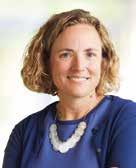 College of Communication
College of Communication

IGNATIAN MOMENT
“Be grateful because gratitude is what energizes and motivates us to pursue great purpose. As Ignatius says, we each ought to ‘ask for interior knowledge of all the great good [we] have received, in order that, stirred to profound gratitude, [we] may become able to love and serve’ (#233, Spiritual Exercises).”
—Chris Lowney, Heroic Living
1letter
the dean
from
A Inside Information Requests
When Dr. A.Jay Wagner worked as a reporter in Chicago, he became both fascinated and frustrated by the freedom of information process. He’d file requests for government data under the Freedom of Information Act, which requires full or partial disclosure of information upon request within 20 days. But Wagner received delays and denials more often than he received useful data.
Now, as an assistant professor of journalism and media studies, Wagner teaches students to file FOIA requests. They feel a similar frustration with the FOIA process, puzzled by why their requests get denied or delayed. It’s something Wagner still experiences — he recently filed a request with the Department of Commerce headquarters that was delayed after needlessly being split into requests to 27 subdepartments. “It turned into a giant headache,” he says.
According to Wagner’s ongoing research, many members of the public feel that same pain when filing FOIA requests.
While Wagner’s research is nascent, he’s conducted surveys finding that people who file federal FOIA requests tend to be educated, politically liberal males. Wagner’s surveys also find that people of color are less inclined to submit FOIA requests based on doubts that the laws are effective.

In addition, his surveys show that FOIA requests from the commercial side — lawyers and information brokers — are far more successful than requests by private citizens. Therein lie Wagner’s conflicted feelings about FOIA laws.
Federal FOIA laws were first passed in 1966, created to provide access to government information, which the Supreme Court often affirms is vital to how democracy functions. “It’s the idea that we can all participate, that we can all be informed, that we all have a fundamental understanding of what our government is doing,” Wagner says. But despite the law’s great potential for transparency, he believes that the FOIA process often falls short.
In another study, Wagner and four research assistants filed more than 1,100 FOIA requests across 10 states. They found that areas with greater racial minority populations have slower FOIA processes and more request denials, while states that have FOIA advocacy organizations have far more successful FOIA outcomes.
“You start wondering how the system has been warped and who it’s actually serving at this point,” Wagner says. “That’s what we’re trying to find out: Who does this system actually serve?”
Wagner hopes that in the future, FOIA laws can better serve all citizens. In an increasingly digital world, he wants more government information to be automatically posted online, no information requests necessary. With information more transparent and available, FOIA requests would be needed less.
“Hopefully, the government will be more proactive about putting information out there,” Wagner says. “And when there are gaps that need to be filled, we can request that information.” —Hal Conick
2
Marquette University Diederich College of Communication
Journalism professor researches whom freedom of information laws truly serve.
A Shining the Light
Ten years ago, Stephen Hudson-Mairet, professor of digital media and performing arts and then department chair, had a group of students of color in his office. They had an honest question for him, one that he didn’t have a good answer to at the time.
“Where are the opportunities for us?” they asked.
Hudson-Mairet says that question first led to some new productions within the theatre seasons. “But they felt ‘one-off’ and not programmatically intentional,” he says. This prompted planning and grant applications in order to “give our students a consistent opportunity to share their stories and to diversify the voices we share on stage at Marquette.”
This past spring semester, the Voices Included for People of Color Theatre program, also known as VIP, held its inaugural show, a production of Loy A. Webb’s The Light The production was carried out with a $25,000 grant from the university, Hudson-Mairet says.

The goal of the program is to give students a chance to work with professionals of color in the industry and act out plays that touch on themes important to their communities.
“I think it’s critical that any artist is able to see themselves and hear themselves on the stage,” Hudson-Mairet says.
The Light was no exception. The one-act play revolves around Genesis and Rashad, a young Black couple on the night of their engagement who get into a heated debate on several social issues spurred by the subject of a controversial rapper.

Performing arts student Martilia Marechal got a shot at her first lead dramatic role as Genesis after mostly starring in musicals. Being able to connect with the audience was the most rewarding part of the experience, she says, especially considering the play’s relevant subject matter.
“The biggest takeaway for me was when I could talk to people after the show and they were crying or something really just connected with them,” Marechal says. “I think that’s why this play was so beautiful.”
For student Joseph Brown, who transferred into the theatre program after studying nursing, the exposure goes a long way. He starred as Rashad in his first stage play. Brown says the play gave him a chance to develop his skills as an actor, an opportunity he might not have had before.
“Being sprung into one of those lead roles was super challenging, but in a great way,” Brown says. “It allowed me to push myself further and really envelop myself into the character and hone my skills in a way that I wasn’t able to previously.”
Hudson-Mairet is encouraged by the budding program. “We have provided a wider set of opportunities for all of our students. That’s a win-win for everybody.” —Matt Martinez, Comm ’20
3news
Marquette’s VIP Theatre program strives to give voice and opportunities to students of color.
Joseph Brown and Martilia Marechal star in The Light, the first production to be showcased through the VIP Theatre program.
A Stealing Thunder
For more than six years, Dr. Young Kim worked as a public affairs officer for the Korean army, specializing in crisis communication. His gut instincts often helped him have fruitful interactions with the press, public and even families of victims amid crises. But experience and gut instincts were all he had — sometimes, they’d steer him wrong, and Kim could never quite figure out why.
Those moments now drive his research. Kim, associate professor of strategic communication, wants to know why some crisis responses work better than others. At this year’s International Public Relations Research Conference, he presented a paper on pre-emptively debunking misinformation amid crises. It was named one of the conference’s top papers.
Kim’s paper focuses on how companies can communicate with employees when a crisis could lead to the spread of misinformation. For example, if a CEO finds out that a former employee was filing a racial discrimination lawsuit based on false information, how should the company respond? To find out, Kim conducted an experimental study with more than 1,000 full-time employees within the United States.
Through that study, Kim found that sometimes, like when a damaging leak is possible, it’s best to elaborate on why the misinformation is incorrect rather than offering a simple rebuttal. In this approach, timing is of the essence. If misinformation can spread outward through a third party, such as social media or news reports, Kim says that companies must voluntarily reveal the correct information to employees and the public before the third party can.
“That’s called the ‘stealing-thunder strategy,’” Kim says. “By voluntarily revealing crisis information, you can protect your reputation and increase your credibility. You can get more support as well.”
The stealing-thunder strategy is especially important for maintaining positive relationships with employees, Kim found. If employees learn about a crisis from the company first, they tend to see leadership and the company as more transparent and trustworthy. Often, the stealingthunder strategy can even turn employees into advocates for the company in crisis. “When you choose the more proactive stealing-thunder strategy, you can protect your internal reputation,” Kim says. “You are more likely to have success and see more positive outcomes.”
Kim wants crisis communication professionals to have something more than their gut and own experiences to rely upon.
“We’re studying this to provide more practical recommendations for the crisis communication professionals,” Kim says. “That’s one of the reasons why I chose crisis communication as my main research area.”
As he continues to research the best ways to respond to misinformation amid crises, Kim is expanding his work to the societal level. He’s now working on research to better understand how conspiracy theorists communicate online, a trend he became fascinated with during the pandemic.
—Hal Conick
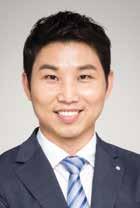
4
Marquette University Diederich College of Communication
Strategic communication professor studies how businesses best communicate amid crises.
“That’s called the ‘stealing-thunder strategy.’ By voluntarily revealing crisis information, you can protect your reputation and increase your credibility. You can get more support as well.”
– DR. YOUNG KIM
A Master Shot
Feature film project gives students a close encounter with the filmmaking process.

For 20 days in June, Engineering Hall, Wisconsin Avenue and other Marquette campus spots became filming locales for a feature-length independent film described as Good Will Hunting meets The Bourne Identity

The screenplay for the film Diffraction, written by Kristin Holodak, associate professor of digital media and performing arts, tells the tale of a young Army veteran who is hired as a janitor on a university campus and discovers a researcher making deadly secret weapons. The vet must stop her before people die. The film, now in postproduction, is acting as a master class for dozens of Marquette students majoring in digital media, theatre and advertising who are working under the guidance of established film professionals and faculty.
Most college-level digital media programs focus on “shorts,” which typically run 15 minutes or less, Holodak explains. But she chose to engage students in a bigger, more ambitious project: a feature-length action thriller. This has meant long, intense days for the cast and crew, but allows students to develop skills they can apply to a host of digital media projects. “If they can do this,” Holodak says, “they can do anything.”
“It’s a dream come true to have this kind of project to work on, especially in college,” says Trevor Tosto, a digital media major who served as first assistant camera during filming in June. He worked closely with a professional cinematographer and appreciated the chance to observe Holodak in her writer-director role. “Her passion for the project is really motivating,” Tosto says.
Holodak wrote the script in 2021 and then recruited students to participate in preproduction work. This included casting theatre students and professional actors for roles in the film, scouting locations and preparing costumes before filming began. Students in Marquette’s Editing Techniques course will edit the film this fall. Those in the Sound Design course will tackle the sound in spring 2023. And advertising students will create a marketing campaign for the film as part of their senior capstone projects. “If things go well,” Holodak says, “in the summer of 2023, we’ll have a friends and family screening on campus for everybody who helped.” Screenings at film festivals are possible too.
The film is funded by a grant from the Diederich College, a Marquette Summer Faculty Fellowship and an award from the Institute for Women’s Leadership on campus. Holodak’s own production company, Heron Media, is also donating resources to complete the film.
Holodak sees Diffraction as a pilot project, a way to test out the process of making feature-length films at Marquette on a regular basis, and she hopes to attract the funding to make this happen. In the meantime, she is optimistic about the possibilities for Diffraction
“Our students are great,” Holodak says. “They’re so enthusiastic and so keen. They’re up for it.” —Erin O’Donnell
news 5
A Reporting for Change
New course examines how inclusive storytelling can be used as an instrument for justice.
The Diederich College of Communication empowers the next generation of journalists to Be The Difference. Dr. Ayleen Cabas-Mijares, assistant professor of journalism and media studies, strives for the juniors and seniors who sign up for her Social Justice Reporting class to be exactly that.
“In the journalism program, we’re trying to live by this model of journalism that matters,” CabasMijares says. “The way I interpret that is: How do we use journalism as a tool for social justice to uphold the dignity of people who have been historically oppressed?”
Cabas-Mijares knew class lectures were important but not enough to drive this issue home. So she partnered with Marquette’s Service Learning Program to have students spend a few hours each week with university community partners — Black and Latino public schools, foster care
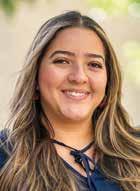

programs at local hospitals and environmental justice groups — to learn about their work and the communities they serve. She says when students built a relationship within the local community, the narrative of their stories began to change.
Cabas-Mijares says we often only learn about Milwaukee’s minority communities when there’s a crime or tragedy, but that is not the complete story. “The members of those communities are the very people working to improve it,” she says. “The best solutions often come from the community itself.”
Slowly but surely, Cabas-Mijares witnessed her students gaining more confidence in conducting rigorous reporting about marginalized communities and their initiatives. By the semester’s end, they had started to think more critically about story assignments, sourcing and language.
Students also covered the on-campus Justice in Action Conference, a one-day event for Marquette students to explore their roles in service, community and social change. The articles and videos that resulted from this assignment address complex topics, such as the prisonto-school pipeline, mass incarceration and the role of art and healing in resistance, and were published in the university’s digital newsletter, Marquette Today
Cabas-Mijares tries to extend this work beyond the classroom. She sits on the faculty advisory council for Marquette’s Institute for Women’s Leadership, where she supports the work of female faculty and staff on campus. She’s contributed to the institute’s push to address gender equity concerns on campus, drafting recommendations for President Michael R. Lovell to cultivate a framework of change at Marquette.
The Social Justice Reporting course represents more tangible change that is welcomed by Rev. Ryan Duns, S.J., assistant professor of theology. “Jesuit education stresses the importance of discernment. To discern well we need to hear all voices,” he says. “Learning to lift up and listen to each voice, especially those that have been historically marginalized or silenced, is crucial. Learning to appreciate a variety of viewpoints and stories can deepen our appreciation for the richness of our diverse experiences.”
“The seed is planted,” Cabas-Mijares says. “Students can use that social justice lens in what they do as they go out into the world and keep writing stories.” —Aly Prouty, Comm ’19
6
Marquette University Diederich College of Communication
Illustration by Alice Mollon / Ikon Images
A Full Circle
Gerry Ahern, Jour ’87, has had a “front-row seat” to some of the greatest moments in sports history as Yahoo Sports’ managing editor of colleges and investigations, and USA Today Sports Media Group’s vice president of content. His loaded résumé includes investigative probes into the University of Miami football program and illicit benefits provided to Reggie Bush at USC — the former won first place in the Associated Press Sports Editors annual contest for investigations and garnered a Pulitzer Prize nomination; the latter ultimately led to the Trojans vacating a national championship and Bush relinquishing his Heisman Trophy.
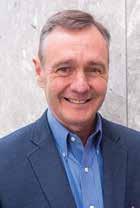
Ahern has brought his impressive real-world experience to Marquette this fall as the director of student media, a role through which he plans “to instill the importance of diligence and ethics in reporting and writing to help prepare students to be the next generation of great journalists and to make a positive impact in the world.”
He’s prepared to walk alongside students as they face some of the profession’s greatest challenges, ones he’s faced himself: “Remaining credible and disproving the portrayal in some circles of media bias and ‘fake news.’ Capitalizing on the audience’s insatiable thirst for unique, accurate, reported news and information, delivered in real time on multiple platforms. And giving readers a reason to subscribe to their content and keep coming back for more,” he says.
As Marquette students are routinely producing awardwinning content, there’s no doubt Ahern will be working with the cream of the student media crop. Among some of the 2021–22 award highlights: The Marquette Wire was named a top-five finalist in the College Media Association’s national Pinnacle Awards for Best College Media Outlet of the Year, and John Leuzzi, executive sports editor of the Marquette Wire, was named the Wisconsin Newspaper Association’s 2022 Collegiate Journalist of the Year.
“This is a perfect match,” Ahern says. —Sarah Koziol, Arts ’92
A Comings and Goings
The
The Diederich College expresses its deep gratitude to these remarkable faculty and staff who recently retired after years of dedicated service to our students: Dr. Daradirek “Gee” Ekachai, associate professor emerita of strategic communication; Dr. Jean Grow, professor emerita of strategic communication; Dr. Lynn Turner, professor emerita of communication studies; Dr. Joyce Wolburg, professor emerita of strategic communication; and Mark Zoromski, former director of student media.
The college also welcomes some new faces this academic year: Gerry Ahern, Jour ’87, director of student media (read related story at left); Dave Hanneken, Jour ’86, instructor of practice of advertising; Dr. JoshuaPaul Miles, Comm ’18, assistant professor of corporate and organizational communication; Dr. Katie Miller, assistant professor of corporate and organizational communication; and Julia Schultz, Grad ’10, instructor of practice of strategic communication.
—Sarah Koziol, Arts ’92
news 7
Alumnus Gerry Ahern returns to Marquette to lead the next generation of award-winning journalists.
college honors the distinguished careers of retiring faculty and welcomes a few new experts.
A Above and Beyond
The Diederich College honors its 2022 Alumni National Award recipients for their commitment to the Marquette mission.
COMMUNICATOR OF THE YEAR

John Salak, Jour ’79
After more than 30 years as an awardwinning journalist, John Salak now leads two organizations that help businesses and individuals better themselves. Salak has worked pro bono with several nonprofit groups, including the Cristo Rey Network to help it build members, raise funds and support operations.
BYLINE AWARD
Michael Huang, CJPA ’93
As the managing editor for sports at The Philadelphia Inquirer, Michael Huang is motivated by supporting the personal and professional growth of his team of reporters and editors. When he isn’t leading his team in the newsroom, Huang is teaching journalism students at New York University.
PROFESSIONAL ACHIEVEMENT AWARD
Cheryl Pawelski, CJPA ’89
As a Grammy-winning record producer and record company executive at Omnivore Recordings, Cheryl Pawelski preserves music and the stories of the artists for future generations. Read more about her work on p. 21.
SERVICE AWARD
Brig. Gen. Lorna Chance Mahlock, CJPA ’91
Brig. Gen. Lorna Mahlock is the first Black woman to be promoted to the rank of brigadier general in the Marine Corps. Over her 36-year career, Mahlock has served in a variety of roles ranging from air traffic control to three deployments in Iraq to her current service in IT compliance and cybersecurity.
YOUNG ALUMNA OF THE YEAR
Jennifer Lada, Comm ’02
As a reporter and host for ESPN, Jen Lada shares stories of teams and athletes overcoming adversity. In 2020, Lada earned her first Sports Emmy Award for the E:60-produced feature Hilinski’s Hope, which has been widely praised for helping others who are battling mental illness.
JAMES T. TIEDGE MEMORIAL AWARD
Benjamin Tracy, Comm ’98, Grad ’04
As the senior national and environmental correspondent and previous White House correspondent for CBS News, Ben Tracy views his role as a journalist as that of a servantleader. His work has been recognized with six Emmy Awards and two Alfred I. duPont-Columbia University Awards honoring excellence in broadcast news.
8
Marquette University Diederich College of Communication
FLASHBACK
A
An unidentified reporter works on her story in The Marquette Tribune offices, circa 1992.
A Recipe for Success
Pilot programming to improve student success gets underway in the Diederich College and across campus.

Even before the pandemic struck, it was hard to predict how well first-year college students would navigate their new beginnings. In his 2021 address, President Michael R. Lovell lifted student success to the top of the university’s strategic priorities and announced a new Student Success Initiative. The comprehensive committee work behind the initiative was co-chaired by Diederich College Dean Sarah Feldner. Its goal is threefold: increase student retention rates; identify barriers and reduce time to graduation; and create a coordinated network of student support services.
To achieve these goals, the Student Success Initiative considers student touchpoints from advising and internships to high-impact learning and first-generation initiatives. The Diederich College began piloting two related programs this past spring. The Ambassador Program is involving current students in student tours, Discovery Days and Admitted Student Days throughout the year. Expansion this fall will add a peer-mentoring program for first-year students and a revamped, more interactive first-year experience course, Communication Pathways. The college is also adding tutors for core classes, a study-buddy program and weekly mixers.
The Navigator Program, another pilot, has faculty connecting more closely and sooner with first-year students. Faculty advisers will meet with freshmen as a group during orientation week. The plan is to reach out to students who may need extra guidance by week three. This will allow for at least two contacts with faculty before advising week begins.
“Ultimately, our goal is about retention,” says Tracey Sturgal, faculty director of student success. “We want to help students build community and connections earlier in their college career and help smooth out the culture shock that can often happen in a student’s first year of college.” —Sarah Koziol, Arts ’92
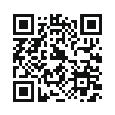
HELP OUR STUDENTS RISE.
By opening doors through scholarship, you have the power to change lives for Marquette students. Your generosity allows talented young people to be driven more by what they can become than by what they owe.
Support scholarship at marquette. edu/giveonline or contact Paul Markovina at 414.288.4512 or paul.markovina@marquette.edu.
news 9
GOING PRO
By DIANE M. BACHA Photos By ALIZA BARAN
A novel student agency launches from the Diederich College, providing students real-world experience and clients access to young talent.
 Account coordinator
Patrick Leahy and student general manager Gabriella Santamaria
Account coordinator
Patrick Leahy and student general manager Gabriella Santamaria
The conversations began about three years ago. What if undergraduate students in the Diederich College of Communication could get real-world experience in an agency? What if they could work directly with clients and build professional-level portfolios even before graduation?
It wasn’t a wild idea. Student agencies operate on other campuses using various models. Marquette was looking for something similar yet more ambitious. “We wanted students to be involved in making strategy decisions and generating solutions for clients on the highest level,” says Dr. Sarah Feldner, dean of the Diederich College.
And that’s what gave one Kansas City alumnus an idea. “I started thinking about what that could look like,” Angelo Trozzolo, Comm ’97, says. “And I ran the idea by them.”


Trozzolo runs Trozzolo Communication Group of Kansas City, Missouri, a company founded by his father. Since graduating from Marquette, he has remained in close contact with Marquette — even more so after two of his children enrolled. In recent years, that included some conversations with Feldner and her predecessor, Dr. Kimo Ah Yun, who is now provost. The student agency concept was a recurring topic.
The idea Trozzolo proposed: a partnership between Marquette and Trozzolo Communication Group to create a firm in Milwaukee with professionals working alongside students. Not a marketing research lab. Not a shop turning out brochures. A full-service agency delivering professional-level services to clients with real budgets.
When Trozzolo pitched the idea to Feldner and Ah Yun, “I told them, the best I
“It can help me getout to places I’venever even thoughtabout working.”
Before FlexRide Milwaukee, a job in Menomonee Fallswas out of reach for Brandon, and he is not alone.
“There are a lot of people out there who are trying to work,and they don’t have reliable ways to get to the jobs that you
In that way, FlexRide is “a dream come true,” Brandon said.
Brandon takes FlexRide to Arandell Corp. in Menomonee Falls, where he has been working for the

He rst heard about the service while watching the local news this spring. Soon after, while working at a popular burger chain, Brandon heard about a job opening at Arandell from a friend.
He applied and got the job, which pays him signi cantly more than his previous position, and he’sBrandon uses FlexRide almost every day to get to and from work. He nds that FlexRide is dependable and brings him door to door from Sherman Phoenix to Arandell. With rides costing $1.50 each way, it’s also a great way to save some money.
“It can help me get out to places I’ve never even thought about working,” said Brandon, who plans on continuing to use the service until gas prices go down and he has saved up enough to purchase a vehicle of his own. “I’m telling everyone about you guys, I want people to save their gas and use
Recent student work includes social media posts and flyers for client FlexRide Milwaukee.
could tell, it’s never been done before. But if it’s something that you’re interested in, I’ll dig into it a little more.”
They were, and Trozzolo did. Today that idea has blossomed into Carl Collective, a student-involved public relations, advertising and communication agency in Milwaukee. The first five student workers were hired in April, working with a Marquette faculty adviser and one of Trozzolo’s former Marquette roommates who was hired as director of the Milwaukee venture.
“Nationally, most student agencies work with low-stakes clients and lower budgets,” Feldner says. The Diederich College wanted a more elevated experience, “which we only could do with the kind of budgets that come with paying clients. Having a student-involved agency that is backed by a fully established agency allows us to do this,” she adds.
A deep well of resources
The university-agency partnership and student-professional workforce are what make Carl Collective unique. But what really excites Trozzolo and others is the scope of benefits Carl Collective can offer to clients, students, alumni, the university and the community. All will benefit from a deep well of resources: the Trozzolo group’s wide-ranging expertise and experience; the Diederich College’s faculty, alumni and community connections; a seasoned and well-connected local director; and a steady pool of young talent.
In just its first few months, Carl Collective was already working with clients on communication strategy and planning, website updates, a media event, social media messaging, design projects and more. Some clients had come over with director Erik Brooks, Comm ’97, from his former communication agency. Others were new, and more were in the pipeline.
11
A Dream Come True
going pro
Student associates and a student general manager work for an hourly wage — juggling their part-time Carl Collective duties with their studies — and get a lesson in billable hours. Each is hired through graduation. Carl Collective jobs can earn internship credits if a student chooses and if they meet the standard internship requirements.

“I’m most excited that students have the opportunity to do real work for real clients,” says faculty adviser Dave Wilcox, a strategic communication instructor who became involved with the concept early on. “This will be portfolio work — a marketing strategy, a media plan, a PR treatment. It’s going to be way cool.”
“I’m excited to tell the story of Carl Collective,” says Brooks, a former classmate of Trozzolo’s who worked in newspapers and corporate communication before forming his own communication firm. At Carl Collective, he’s running day-to-day operations. “I think we’ll
be able to provide a real value that you probably can’t find anywhere else — or certainly not many places.”

That value includes something most companies are scrambling for: insights from young consumers.
After word got out about Carl Collective, Brooks quickly began fielding inquiries about its “secret weapon” of Gen Zers. “Insights from Gen Z are a big deal,” he says. “I had lunch today with a potential client where that exact need came up. A lot of people want that, and we’re in a unique position to deliver it.”
It remains to be seen how the Gen Z factor will be worked into Carl Collective’s strategic vision as it takes shape. But including young voices around the table will most assuredly have an impact. Patrick Leahy, Comm ’22, the firm’s first student general manager who was later hired as a full-time account coordinator, says, “Clients appreciate that we can produce great work with the fresh perspective of college students. This happens when industry professionals and students just launching their careers collaborate together.”
Hitting the ground running
The startup process involved tasks you won’t find on a communication curriculum: ordering furniture for a work and collaboration space in Johnston Hall, scouting offcampus office locations, trying to figure out a scheduling system. There were potential clients to meet with, backoffice details to coordinate with Kansas City and logistical procedures to iron out. By all accounts it was hectic and rewarding.
“This agency is fast-paced, caring and evolving,” says student associate Verónica Rosado. “Three qualities that I look for in any workspace.”
12
Marquette University Diederich College of Communication
“It’s rare to find a workplace that encourages a free flow of creativity from students,” says Gabriella Santamaria, a senior and Carl Collective’s current student general manager. “That’s what we have here. It’s a great atmosphere.”
Rosado, Santamaria and their colleagues don’t take any of it for granted. They know how valuable the experience is, and they’re aware they are helping build something. “I get to be a part of the beginning of something huge and important, which will stick with me for the rest of my life,” Rosado says.
The opportunity resonates differently but just as vividly for Trozzolo and Brooks, who marvel that they’re finding themselves back in the same building — Johnston Hall — where they forged a friendship, put out a newspaper, and in Brooks’ case met his future spouse, Sarah (Hammill) Brooks, Comm ’97. They’re grateful for the chance to give back as well as launch a new venture together.
And the office space they have chosen for Carl Collective’s main office? It’s at Campus Town, the very complex where they lived as roommates years earlier. “It’s uncanny,” Brooks says.
BEHIND THE NAME
CARL COLLECTIVE is named after a man who in many ways inspired its mission: Carl Schrank, a longtime professor at Marquette who came to teaching after a successful public relations and marketing career. He died in 2019.
Schrank, Jour ’57, Grad ’91, was Angelo Trozzolo’s adviser during his years at Marquette and made an indelible mark on him. Trozzolo credits Schrank with helping him land his first job and encouraging him throughout his career. The two remained close long after Trozzolo graduated. They placed bets when their teams played each other (barbecue for Schrank if the Packers won, German food for Trozzolo if the Chiefs won) and visited with each other whenever Trozzolo was in Milwaukee.
“He kept in touch with all of his former advisees,” Trozzolo says, sending group emails and placing phone calls to ask how things were going with their careers.
In forming a partnership
with the Diederich College to create a student-involved marketing communication agency, Trozzolo floated the idea of naming it after Schrank. It seemed appropriate for a man who gave back to Marquette by mentoring students and who modeled the art of asking good questions before offering advice.

“I see him sitting back in his chair in his office like this,” says Trozzolo, clasping his hands behind his head, “to talk about your future. And you left feeling invigorated — he’s got your back.” It shaped Trozzolo’s business approach, which puts the focus on understanding clients and solving problems for them.

Carl Collective’s secondary logo is a line drawing of a smiling Carl Schrank. When Trozzolo sent it around to some of his old Marquette friends, more than a few got teary-eyed.
“It just makes me feel good to keep his legacy alive. It’s such a great one.” —Diane M. Bacha
13going pro
A beloved communication professor inspires the name of a new student agency with a mission befitting of his legacy.
Far left: Leahy with student associate Izzy Osborne. This photo: Agency Director Erik Brooks (standing) talks to the team.
ON THE FRONT LINES
By KATELYN FERRAL, COMM ’10 Illustration by JESS SUTTNER

Alumna
Katelyn Ferral reflects on her difficult but necessary journalistic duty to tell the stories of Ukraine’s refugees.
It was day four of reporting at refugee checkpoints along the Ukraine-Poland border when the look on one woman’s face stopped me.
She was waiting in line to enter a vacant grocery store turned refugee shelter. With the weather overcast and cold, she and dozens of others stood in small groups in the store’s parking lot, holding suitcases and stuffed grocery bags. Volunteers quickly spooned soup into bowls at stands outside and folded sweaters and blankets on tables for the taking.
Police and volunteers minded the entrance as I approached. No media allowed.
I was on assignment with USA Today, covering the humanitarian crisis invoked by the Russia-Ukraine war and had interviewed many who had just left their lives and family members behind. It was my job to talk to people, get a glimpse of who they are and what they are experiencing — a lot of ground to cover in a short conversation through a translator. Then I had to distill those conversations into compelling stories for readers in the U.S.
I gently approached people in and outside of train stations, grocery stores, border checkpoints and food stands and while they were sitting on parked buses awaiting processing after entering Poland.
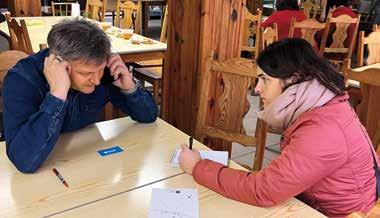
Today, I scanned the crowd in front of the store and again glanced at the woman waiting in line. She stared ahead with a blank look, two grocery bags at her feet and three children running in circles around her. She looked exhausted, as if she was living the worst day of her life, as if she could burst into tears at any moment if she wasn’t too tired to do so.
One part of me felt like I still needed to approach her. I was sent here on an expensive international reporting trip to talk to as many people as possible, to share details and distinct dimensions of what was happening. I needed to produce.
The other part of me could not do it.
I milled about with my notebook out, my fingers getting numb, my eyes surveying this group and that group. Other reporters from all over the world hovered around groups of refugees as they disembarked from buses — some with long-lens cameras, others with film crews — practicing their scripts and interviewing Ukrainian families on camera. More and more buses drove in, unloading more women and children.
I headed back to the car with my interpreter, Hubert, a 21-yearold Polish bodybuilder who makes money teaching people on YouTube how to invest in cryptocurrency.
I teared up and tried to hide it, but the tears kept coming. I was tired, sad at the world and mad at myself. I was too sensitive. Full-time foreign correspondents probably never cry.
“I’m sorry. I don’t know why I’m crying,” I said to Hubert.
“It is OK,” he said in his thick Polish accent. “Sometimes we need a time to cry.”
Asking questions is a fundamental part of being a journalist. I’d done it many times before in tough circumstances. But throughout my career I’ve learned to listen to my gut. If our aim as journalists is to open a window into another human’s experience, an important part of doing that well is being mindful of the process by which you are capturing their story.
Most Ukrainians I approached were exceedingly gracious and patient in sharing their stories. Those I encountered on the border are now refugees, but they remain dentists, engineers, nail technicians and store managers. Their new reality does not eclipse their whole life. They are refugees not because of who they are but because of what they are experiencing.
More than 1.4 million Ukrainians have fled the war into Poland with nearly 7.6 million people leaving their home country in all since February 24, according to the United Nations. When millions of people are going through the same experience, it becomes easy to rely on labels and focus on numbers in one’s writing, especially when the numbers are so large. But that doesn’t help readers understand the experience or the person enduring it.
As the war in Ukraine continues and tragedies continue to occur there and in our own country, it can be hard to believe that one small story can do much good.
I must keep choosing to believe it can.
15on the front lines
Reporter Katelyn Ferral interviews Pastor Henryk Skrzypkowski of Chelm Baptist Church, near the Ukrainian border in Poland. The church opened a large refugee shelter in March and was active in placing Ukrainians in more permanent homes throughout Europe.
La Isla del Encanto
The Diederich Experiences relaunch with flair as a cohort of communication students explore career opportunities with Marquette alumni on the captivating island of Puerto Rico.
 By Ann Christenson, CJPA ’91
By Ann Christenson, CJPA ’91
Diederich College students and staff, along with Dean Sarah Feldner (above, fifth from right), explored Castillo San Cristóbal during their Diederich Experience in Puerto Rico. The fortress was one of several historical sites they visited alongside career explorations with alumnus Bernardo Fiol-Costa.
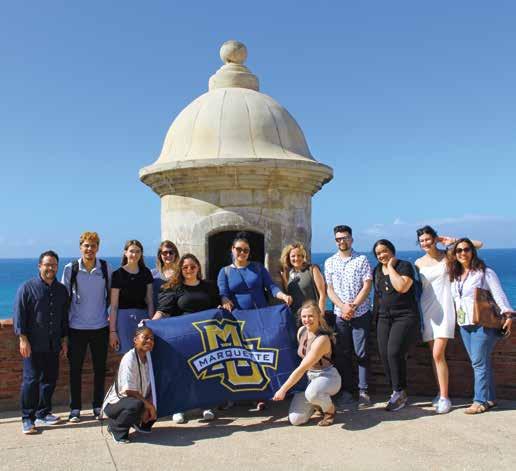
The trip was a whirlwind, and it almost didn’t happen. A unique experience program that allies Diederich College of Communication students with alumni and other professionals who work in their fields of study was set to return over the 2021 winter break — after a two-year pandemic-related absence — when the COVID-19 Omicron variant hit. To the relief of the 10 students set to embark on the trip, the stars aligned over spring break 2022, and those students, joined by Marquette faculty and staff, were able to make the more than 2,000-mile journey to the island of Puerto Rico to get a feel for what it’s like to work as a broadcast and print journalist or public relations and marketing professional in the vibrant, history-rich capital city of San Juan.
The four-day trip was a defining one for the students, many of whom were in the last months of their college careers. With a combined study of journalism, digital media and Latinx studies — and as a Latina student herself — Alexa Jurado, Comm ’22, says it was “nice to see minorities that are successful at what they do.”
The trip would not have happened but for the vision of Marquette alumnus Bernardo Fiol-Costa, CJPA ’93, president and founder of the public relations/digital marketing firm
The Big Think Group in San Juan, and Diederich College Dean Sarah Feldner. “It was April 2020, during the pandemic,” Fiol-Costa recalls. “We were all in lockdown, bored. I started looking at Marquette’s website and what the university has been doing and doing for the best.”
Impressed with what Marquette has accomplished in the last 30 years, on a whim, he emailed Feldner, looking for a way to give back. His story and interest resonated with Feldner, and that culminated with Fiol-Costa and his family making a trip back to Milwaukee. Touring the campus, meeting with the dean and reconnecting with “this super-hightech and wonderful” university that “gave me so many opportunities” planted the seeds for the Puerto Rico Experience.
Feldner summed up the Puerto Rico Experience with a note of acknowledgment: “We are grateful to have opportunities like the Diederich Experiences that allow our students a unique chance to explore the field of communication. Having Bernardo on the ground in San Juan, paving the way and setting up our visits to local agencies and media outlets, was a gift that created an incredibly rich experience for all of us.”
The Diederich Experiences premiered in spring 2017 with a trip to Los Angeles in which six digital media and journalism students met with Marquette alumni in film and television. The college followed that successful immersion with three new experiences the following year: in Chicago twice, once for advertising students and then again for journalism students, and in New
17la isla del encanto
Encanto
York City for theatre arts students. The itineraries are jam-packed, the students motivated and the alumni eager to show off their industries. The program has been a big hit among students and alumni alike.
Fiol-Costa served as host for this Puerto Rico retreat, using his connections on the island to set up tours, networking events and meet-and-greets with its many communication professionals. “It was a very hands-on experience,” he says. The itinerary was also rigorous. The first professional event introduced students to some of Fiol-Costa’s company clients — from T-Mobile to the Chrysler Group.
The day after they arrived on the island, the students kicked off their survey of the communication field, visiting the offices of GFR Media, which operates two newspapers in Puerto Rico, El Nuevo Dia and Primera Hora. With aspirations of being a print news reporter, Jurado says the stories she heard from the papers’ reporters suggested their commitment to service. “The impact they had on the political corruption there … reaffirmed what I want to do and inspired me,” Jurado says. How the news source handled a major natural disaster — 2017’s devastating Hurricane Maria — gave the students
a better understanding of how breaking, world-changing news is covered.
For Riley Lade, Comm ’22, the GFR journalists’ collaborative approach to other media covering the same story was eye-opening, a point in time where work and real life intersected. “GFR was the only hub up and running while Puerto Rico was in shambles,” Lade says. “They opened up their doors to everyone. They were able to house people at their offices.”
Piggybacking on their visit with the GFR Media team and amid the “afternoon business rush,” as Fiol-Costa called it, the Marquette crew landed at advertising/communication agency DDB Latina Puerto Rico, whose clients include Walmart and L’Oréal Caribe. Hearing the executives talk about how they tell stories through ad campaigns and
Students got a through-the-lens look at WAPATV’s studio and newsroom.

Hurricane Fiona ripped across Puerto Rico on Sept. 18, 2022. The storm dumped up to 30 inches of rain in some regions of the island. Catastrophic flooding, landslides, power outages and drinkablewater access have been major concerns plaguing residents ever since.
If you are interested in helping Puerto Rico at this difficult time, please consider contributing to ConPRmetidos, an independent nonprofit organization that works with grassroots organizations to activate an immediate relief and recovery plan. Visit conprmetidos.org and click on the Hurricane Fiona Relief button to donate.
18
Marquette University Diederich College of Communication
Observing a live newscast was one highlight of the student experience at WAPA-TV, whose studios are located in the heart of San Juan.work closely with clients gave them a taste of different careers, explains Jurado. “If I ever wanted to pivot to PR and advertising, I have an idea of the things I can do.”

The final visit of their experience was to WAPATV, which included tours of the newsroom and TV studio and a through-the-lens look at covering the news as it’s unfolding. From behind the rolling cameras, the students watched the anchor in the thick of her daily newscast. When the cameras unexpectedly turned to them for a quick shoutout, they waved to viewers. “It was so unexpected and cool,” says Lade, who has recently embarked on a digital media career as a video assistant for Marquette.
Another student, Rachel Ryan, Grad ’22, who has since earned her master’s degree in digital communication strategies, brought to the trip her experience in marketing for the EAA Aviation Center in Oshkosh, Wisconsin. With a goal of being a storyteller in journalism or sales and marketing, Ryan says she was excited to see the work opportunities in Puerto Rico and make connections with the professionals there. Alumni, too — with whom the students were able to connect at an evening reception in their hotel and at a dinner hosted by Tim Mullen, Comm ’96, who co-founded The Cervantes Group with his wife, Joanna Bauza, Bus Ad ’97. “It was good to get out of my comfort zone for language and culture,” Ryan says. “It showed me I can move somewhere else and feel comfortable.”

The schedule also made room for exploration of the old city of San Juan, which the students found as valuable a component as the career enrichment. “Being able to experience a culture outside of the Midwest was a highlight,” says Lade. “I come from a large family and haven’t had the opportunity to travel that much. There’s so much to explore.”
In terms of big takeaways, several students say their experiences in Puerto Rico gave them an appreciation for the robust spirit and pride of Marquette alumni. Of host Fiol-Costa, Lade says, “I felt like I’d known him for 15 years. He’s passionate about what he does, which showed me what I could be.”

19
la isla del encanto
FULL POTENTIAL
When she was younger, Shannon (Webster) Maher, Comm ’14, did not take ownership of the power of her disability.
“As someone with cerebral palsy, I was born with my disability. It’s just part of who I am,” she says. As she entered the job market after graduating from Marquette, she hoped employers “would overlook the fact that I have a hard time walking or that I use a wheelchair.”
However, once she got to work, she realized how navigating life with a disability has sharpened her communication skills, critical thinking and adaptability.
“I’ve learned critical skills that maybe other people don’t develop,” she says. “All of these things that come naturally to me don’t come naturally to everybody else.”
Maher has put those skills to use over the course of her career, starting with her first job out of college at ComEd, the power company serving northern Illinois, as a recruiting coordinator.
“It really was a crash course in recruiting and I loved it,” she says. “I loved making the connection with people and connecting people to a job that was the right fit for them.”
At ComEd, Maher was involved with the Chicagoland chapter of Disability:IN, a nonprofit that works with the business community to advance disability inclusion. She persuaded ComEd’s leadership team to become a Disability:IN corporate partner. As she continued to promote disability inclusion at work, she also took her message to the Ms. Wheelchair Illinois pageant — and she won the title in 2017, advocating for her platform of increasing employment opportunities for people with disabilities.
Maher’s knack for recruiting and passion for inclusion have come together in her latest career move. In 2022, she left the corporate world to start a new role as manager of Disability:IN’s NextGen Leader Initiatives. The NextGen program serves more than 300 college students and recent graduates who identify as having a disability. Participants get matched with mentors from Fortune 1000 companies and attend job-shadowing events and career-focused webinars.
“We provide mentors for these students to see themselves as professionals in the working community, contributing to society, and not just sitting on the sidelines of their life,” Maher says. “I really wish I had something like this when I was a young college student.”
These days, Maher says her path has come full circle from her start in corporate recruiting to her current role that connects students with disabilities to career resources.
“I’m helping this group of young talent see themselves as the next influencers in the boardroom, in the classroom or in whatever field that they choose. I want them to see that they can use their disabilities to their advantage,” she says. —Lauren Sieben
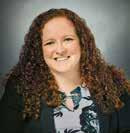
20
Marquette University Diederich College of Communication
1
Alumna Shannon Maher promotes professional opportunities and inclusion for people with disabilities.
UNEARTHED TREASURES
Cheryl Pawelski, CJPA ’89, co-founded her independent label Omnivore Recordings in 2010 after 20 years as a senior leader in A&R (artists and repertoire) and catalog development at music industry mainstays such as EMICapitol Records, Concord Music Group and Rhino Records.

Twelve years of musical adventures and hundreds of releases later, Pawelski and her Omnivore Entertainment Group collaborators have been twice recognized by the Recording Academy for Best Historical Album: first in 2014 for restoring four previously unknown radio concerts by Hank Williams, The Garden Spot Programs, 1950; and again in 2020 for It’s Such A Good Feeling: The Best of Mr. Rogers, a compilation album initiated through the making of the 2018 hit documentary Won’t You Be My Neighbor?
Both those albums unearthed recordings from the Williams and Rogers estates that were never released after being broadcast on radio and television, respectively.
“For the most part, we’re not in the business of reissuing records that never came out on CD or digital; we’re more interested in adding a page or chapter to an artist’s history,” Pawelski says. “Does this record have a story to tell? Does it add something to the story of the artist? If it’s not great music or not that great a story, why waste your time?”
Omnivore Recordings’ catalog has an all-inclusive approach to genre and an impressive historical breadth. The label engages diverse audiences by offering treasured access to cult icons and rare gems from music legends. Pawelski says she wants Omnivore to be the label where people come to discover the interconnectivity of modern musical history.
“If you read enough liner notes and credits, you start to see how interconnected music is,” Pawelski says, suggesting her label has found success with audiences by being smarter and more interesting than streaming services’ recommendation algorithms.
Some of Omnivore’s most warmly received releases have been anticipated by fan communities for years. Steely Dan fans, for example, blogging and gossiping about Linda Hoover’s unreleased album produced by future bandmates Donald Fagen and Walter Becker in 1971, finally had an opportunity to snag a copy this summer on Record Store Day as Omnivore offered Hoover’s album I Mean to Shine as a special limited-edition release.
“People presuppose that everything is available [online], but that couldn’t be further from the truth, especially in music,” Pawelski says. “The other assumption is that digital is free. So much music doesn’t exist on the internet. It costs money to put it there.”
Pawelski encourages music fans to explore Omnivore’s website and see what piques their interests, her hunch being that one album usually leads to another.—Ben Koziol
21the grapevine 2
Two-time Grammy winner Cheryl Pawelski lauded for sharing untold histories of some of music’s most beloved artists.
Photo by Nina Johnson
A COLLECTIVE RESPONSIBILITY
For Deonte Tanner, Comm ’17, coming to Marquette was “a culture shock” and “the hardest but best challenge I’d ever encountered in my life.”
It was hope, says Tanner — who grew up in the underresourced South Side Chicago neighborhood of Englewood — that helped him persevere. Despite homesickness and early academic setbacks, Tanner stuck it out, thinking of the children back home who looked to him as an example of high achievement.
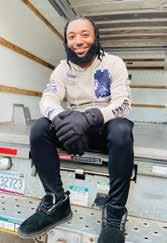
As he doubled down on studying and made friends, Tanner “fell in love” with university life and with what he was learning as a public relations major. He also found himself heralding Marquette’s call to Be The Difference, getting involved in university-sponsored community service projects and even contributing to strategic discussions around improving campus safety.
Back in Chicago for Thanksgiving break his junior year, Tanner wondered how he could be the difference for his own community. Growing up, finding toys and gifts under his family’s Christmas tree hadn’t always been a given, and he’d seen how families stepped up for one another if anyone was coming up short. He told his friends to be ready when he returned at Christmas: They were going to find a way to help a local family — or, perhaps, three families.
On the ride back to Marquette, Tanner ruminated. How would he pick just three families from among an entire neighborhood that needs help? “I knew I had to do more,”
he says. He decided to do a larger fundraiser and giveaway.
A PR-minded Marquette friend encouraged him to name his initiative. As they brainstormed, Tanner articulated his goals. “I’m trying to provide hope,” he told his friend. “I want to bring light where there is darkness.” The name came to him: Servants for Hope.
“Hope is what allowed me to imagine a different life for myself,” Tanner says. “Hope keeps you going, even when you struggle. Once I realized the power and the significance of hope in my life, it was a no-brainer to share that with others.”
That first Christmas fundraiser raised $1,000 for gifts. The next year saw Servants for Hope pull off a Thanksgiving fundraiser and giveaway of 450 turkeys, followed by another Christmas gift fundraiser.
After graduation, Tanner moved back to Chicago, where he is earning his doctorate in education from DePaul University. Servants for Hope continues to gain momentum and visibility: In 2021, it gave away 1,000 Thanksgiving meals from the grounds of Tanner’s church in Englewood and $30,000 worth of Christmas gifts distributed from his mother’s home.
“We all share a collective responsibility to help each other, to serve each other. Ultimately, we all share the responsibility to provide hope to each other,” Tanner says. “That’s how we create systemic change, and that’s when we are at our best in this thing we call humanity.”—Paula Wheeler

22
Marquette University Diederich College of Communication
3
Servant leader Deonte Tanner shares the power of hope when it is needed most.
The Servants for Hope team gave away 1,000 Thanksgiving meals and $30,000 worth of Christmas gifts in 2021.
REPUTATION MATTERS
Corporate communication veteran Tom Smith navigates client repute while inspiring the next generation of communicators.

Clients include a wide range of organizations, from consumer brands to technology and financial services firms. Smith says the diversity of communication challenges keeps the job interesting from day to day.
Tom Smith’s first initial public offering as a corporate public relations practitioner involved bananas and pineapples. It was the late 1990s, and he was working with the investor relations agency that helped Fresh Del Monte take its company public.
Not only was it a great learning experience, Smith, CJPA ’93, says, but he also got to explore much of Latin America on the job, traveling to Guatemala, Honduras and Costa Rica.
“I helped them create their story for the investment community and then took it globally,” he recalls. “It was the first major IPO that I was a part of, and it was successful.”
Fresh Del Monte is one of many memorable projects that comes to mind when Smith reflects on his 30-year career in corporate communication. His resume includes leadership positions at Fleishman-Hillard, Ogilvy Public Relations Worldwide and the global marketing communication agency Allison+Partners where he has served since 2014, first as managing director and most recently as president of its U.S. corporate practice and global board member.
“I watched the corporate practice grow from 10 people when I started to more than 60 people now,” he says. “It’s a team effort. It’s a great culture — great people, tremendous clients.”
“Communications will not solve a business problem, no doubt about it,” he says. “If you have a business problem, you have to solve it. But communications can help tell that solution” to a company’s various audiences.
Putting teams together to help his clients navigate the inevitable challenges — as well as the unexpected, like the COVID-19 pandemic — in an evolving environment that is 24/7, courtesy of social media, is perhaps the most rewarding aspect of his career, Smith says. He has learned plenty over the years, especially how social media has transformed business and how networking transforms careers.
Smith participates in those career transformations by offering networking opportunities for new generations of communication professionals from his alma mater. He recruits interns from Marquette and hosts groups of students on site visits to his firm’s corporate office in New York City.
Smith credits his former communication professor Dr. Claire Badaracco, now professor emerita of public relations, for enlightening him on career opportunities — beyond those in consumer advertising that were popular among his peers — in business and corporate communication.
“That led me into my career today,” he says. “I took that business writing and that degree from Marquette into the field. I became a corporate public relations person, and it’s been a great career path.”—Claire Curry
23the grapevine
4
A HOPE-FILLED LIGHT
Christiana Trapani sparks support for Ukrainians embattled by the darkness of war.
As a second-generation Ukrainian American and owner of Door County Candle Co., Christiana (Gorchynsky) Trapani, Grad ’18, wanted to find a way to help Ukrainians after Russia invaded the country in February. Her idea: the Ukraine Candle — yellow and blue, like Ukraine’s flag — and 100 percent of the profits would go to support Ukraine. She set a fundraising goal of $5,000.
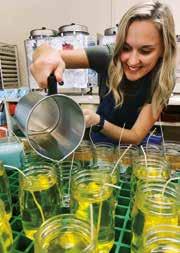
After she posted her story on Facebook and it was shared hundreds of times, Trapani appeared on World News Tonight with David Muir, PBS NewsHour and the Today show, leading to thousands of candle orders from all 50 states and countries around the globe. Her company has since donated $800,000 to Razom, a nonprofit founded in New York in 2014 that is providing emergency humanitarian aid since the Russia-Ukraine war began.
“Our shop is small. We weren’t made for this type of volume, but we’ve gotten creative,” Trapani says of the unprecedented production.
She and her team made their Sturgeon Bay, Wisconsin, storefront smaller to create a larger packing and shipping area. They pour candles outside when weather permits, and
more than 700 local community members have volunteered to help. Like every candle the company sells, each is fully handcrafted, from pouring to wicking to labeling.
Having never made a candle before, Trapani has come a long way since she bought the company.
“I didn’t know the first thing about making candles,” she says. “I had to quit my full-time job with salary and benefits, but I really wanted to take the leap.”
After graduating from Marquette’s master’s program in digital communication strategies, Trapani opened an e-commerce business called Door County Delivered, a giftbox service featuring products from local businesses from her hometown. Through this, she met the owner of Door County Candle who was looking to retire.
“Thanks to Marquette, I saw all the potential for marketing the business and growing it through brand awareness,” Trapani says. “The company is so cool. Every candle is made by hand from start to finish with high-quality ingredients, so I wanted to share that story.”
Since becoming owner in June 2021, Trapani started a newsletter that now reaches more than 20,000 subscribers and has grown the company’s Facebook likes from a few hundred to 10,000. She runs ads on social media and in local publications.
“Not only did Marquette help shape my passion for marketing, it also helped me find a passion for entrepreneurship,” Trapani says. “‘Be The Difference’ really did inspire me to think about how I can be a positive difference in the community I’m living in and beyond.” —Elizabeth Baker, Comm ’18
24
Communication
Marquette University Diederich College of
5
WORDS FROM THE WISE
Former journalism classmates collaborate on a book of reflections 60 years in the making.

Reading the collection of 30 essays bound in Linked by Ink: Marquette Journalism Grads Reflect on Six Decades is like opening a time capsule. Alumni from the Class of 1961 and adjacent years describe attending classes in metalroofed Quonset huts left over from World War II and visiting newsrooms with clattering Teletype machines. Some of the men had already served in the armed forces or expected to do so after graduation.
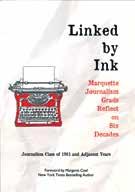
The writers express amazement at how technologically skilled today’s college students are. But don’t underestimate these octogenarians. Their mastery of Zoom videoconferencing software made this book possible.
Journalism 1961 graduates Gloria (Bester) Ford, Carol (Tylutki) Hebbring, Mel (Lytle) Kelly, Lari (Valerian) O’Brien and Claudia (Goodrich) Stone had been reuniting formally and informally with fellow Marquette classmates over the years. Then came the disruptive COVID-19 pandemic. The ’61ers helped 1960 graduates have their 60th reunion over Zoom in 2020. Conversations often moved to their education and the state of journalism today. Someone — Ford believes it was Stone or O’Brien — suggested they had a book.
Working on this project has “brought us a great deal closer,” Ford says of her bond with her Marquette friends. “It has given us firsthand experience about each other’s talents . … We are still women who want to use that talent.”
“The Wild Girls,” as the five have dubbed themselves, asked alums to write 500 to 1,000 words about their experiences at Marquette and beyond. Linked by Ink contributors include
graduates with strong editorial careers, such as James Gannon, Jour ’61, former editor of the Des Moines Register; and Neil Milbert, Jour ’61, a Chicago Tribune sportswriter for more than 40 years. But their life stories also demonstrate the flexible value of a journalism education. While living in Hawaii and raising three children, Stone became fascinated with the geology of Oahu, earning her master’s degree. Geology jobs were a shoo-in after interviewers learned she also had a degree in journalism, she writes. “Many people cannot write well or quickly and specialists who can in any field are sought after.”
Editing their classmates’ essays and bios, the Wild Girls realized they needed a stylebook. Voila! Ford had a Marquette Tribune stylebook (1954 edition), which became their editorial guide.
Linked by Ink looks backward, but the Wild Girls and their classmates like to pay it forward. Starting with their 50th reunion year, they’ve raised funds for an annual scholarship to help support a Marquette journalism student. Book proceeds go to that effort, as well. —Jim Higgins, Jour ’79
To order Linked by Ink, email: the_5_wild_girls@yahoo.com.
25the grapevine
6
40th reunion of the Journalism Class of 1961
DEEPLY ROOTED. AND WAY OUT IN FRONT.
In a world of shifting values, a Diederich College of Communication degree shines out. Our students, faculty and alumni know where we stand: rooted in Jesuit tradition, engaged with today’s concerns and open to tomorrow’s possibilities. Career preparation goes further here with distinctive experiential learning opportunities that connect students with our advancing alumni and prepare them to keep pace with change. To better encourage risks and take on real-world challenges. To shape ethical communicators who ask the big questions, pursue the just answers and truly seek to Be The Difference.
Marquette University, P.O. Box 1881, Milwaukee, Wisconsin 53201-1881 USA


 College of Communication
College of Communication













 Account coordinator
Patrick Leahy and student general manager Gabriella Santamaria
Account coordinator
Patrick Leahy and student general manager Gabriella Santamaria









 By Ann Christenson, CJPA ’91
By Ann Christenson, CJPA ’91













